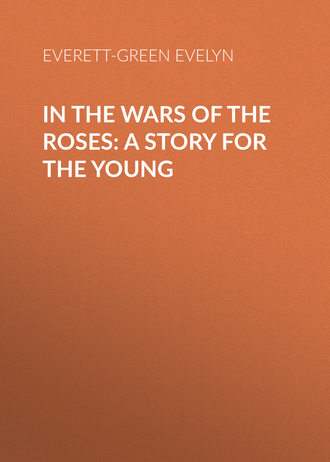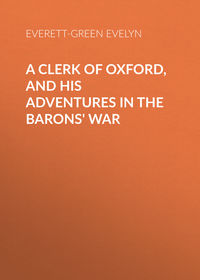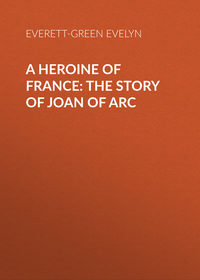 полная версия
полная версияIn the Wars of the Roses: A Story for the Young
"Nay, call me not that. Did I not say I would be nobody's lord for the nonce? What is your name? Paul? Then I will be called Paul for this next hour, and you shall be Edward. See, here is my jewelled collar and the cap with the ostrich plume-the badge of the Prince of Wales. Yes, put them on, put them on. Marry, I could think it was my very self, but a short inch the taller.
"Now, see, I take your cap instead; and now I am Paul, and you must bid me follow you and attend you in your journey through the forest. See, we will be fugitives, flying from the wicked Duke of York, who would fain grasp at the king's power, but my mother will not let him."
For a moment the child's eyes flashed, and his clenched hands and heaving breast showed that the spirit of Margaret of Anjou lived again in her child; but pulling himself up short with a laugh, the little prince added with a deferential bow, resuming his character of subject, "But I crave your pardon, sweet prince, if I lose control of myself in the thought of your wrongs. Lead on, noble lord, and I follow. Let us seek safety in the dim aisles of yon giant wood. Surely there is some ford or bridge nigh at hand which will give us safe crossing without wetting ourselves."
Children are children all the world over, and at any period of its history. Childhood ever delights in romance and imaginative situations and adventures; and before ten minutes had passed the boys had completely entered into the spirit of their play. Paul, shaking off the awe which had at first held him silent and abashed, played the part of prince with an energy and zeal which evoked the delight and admiration of his companion; whilst the younger boy was amused to lay aside for the moment any pretence at royalty, and pay his humble devoirs to his liege lord.
Paul knew of some stepping stones which led across the stream into the dark wood, and soon the boys were in what seemed to them the heart of the great forest. The prince was delighted by all he saw. The sense of freedom was enchanting, and his curiosity unbounded. He had never in his life before enjoyed a game of play in so unfettered a fashion with a comrade of nearly his own age; and soon forgetting even their own game, the boys were walking with arms twined round each other's neck, telling each other all that was in their hearts, and exchanging vows of unalterable affection.
"When I am grown to manhood, and am a belted knight with noble gentlemen of mine own to attend me, you shall be my very first esquire, Paul," said the prince emphatically; "and we will ride through the world together, seeking adventures which shall make all men wonder when they hear of them. And when I am king you shall be my first counsellor and greatest lord. I will degrade from office and dignity those proud nobles who have been traitors at heart to my kingly father, and to you I will give their broad lands and high titles. We will thus be comrades and friends through life. You would never desert me, would you, Paul?"
"I would lay down my life for your highness," cried Paul with enthusiasm. "I will live and die true to the Red Rose-to the sign of the silver swan."
The little prince's eyes kindled.
"I believe you would. I love you, Paul, and methinks that you would love me too. I would that I could take you with me now to be my friend and comrade through life; but perchance your lady mother could ill spare you, by what you say. I know what a mother's love is like."
Paul's face was grave. For the first time in his life he was confronted by the problem of a divided duty-that problem which troubles us all more or less at some time in our history.
"I would gladly go with your highness to the world's end," he said. "I should love to live and die at your side; but I doubt me if it would not be cruel to my mother. She sometimes tells me that her life would be a lone one without me."
"And you must stay with her," said the prince with decision; "at least so long as you are a child. When you are a grown man it will be different. Some day I will send for you, and you shall be my first and best friend; but it cannot be now. My mother might not approve my choice, and yours might not let you go. Princes as well as other men have to wait for what they want" – and the child sighed-"but some day our turn will come."
Then they resumed their play, and the hoary wood resounded to the merry shouts of the boys as they ran hither and thither in active sport, till the little prince was fairly tired out, though, still exulting in his escape from maternal vigilance, he stoutly protested against going back.
"See, good Paul," he said, "here is a right commodious hollow tree, heaped with last year's dead leaves. I will rest awhile hidden away here, where none will find me were they to look for me ever so. And if you could find and bring me here a draught of water from the brook or from some spring, I should be ever grateful. I am sore athirst and weary, too."
The child was nevertheless much pleased with his nest, and forthwith curled himself up in it like a young dormouse, delighting in the conviction that no attendants despatched by his mother to capture him would ever find him here. Boys have been young pickles ever since the world began, and were just as full of pranks in the fifteenth century as they are now. Edward had: a full share of boyhood's mischievous delight in his own way, and owing to the strong will and the ever-present vigilance of his mother, he had not had many chances of indulging his natural craving for independence. Therefore he rejoiced the more in it now, and was quite determined to return to his royal parents at such time only as it suited his own whim.
Paul was willing enough to do the behest of the prince, and stayed only to make him comfortable before starting off on the quest for water. He thought young Edward would soon be asleep, as indeed he was, so luxurious was his leafy couch within the giant oak; and resolved to run as far as a certain well he knew of in the wood, the water of which was peculiarly fresh and cold and clear, and where a cup was always kept by the brothers of a neighbouring monastery for the benefit of weary travellers.
Paul sped away on his mission with a light heart He was elated above measure by his day's adventure, and his head was brimming over with plans and dreams of the future, which was to be so glorious and so distinguished.
He the chosen comrade of their future king! he the loyal upholder of that king's rights, the bulwark of the throne, the trusted noble, the shrewd counsellor, the valiant warrior! A boy's ambition is boundless-innocent of envy or evil, but wild in its flights.
Paul went on his way with glowing cheeks and sparkling eyes, till a stealthy sound in the bushes beside him made him stop short, listening intently. He heard voices in cautious whisper.
"He cannot be far away. He certainly came to the wood. Long Peter says he had another boy with him; but be that as it may, he is here, and close at hand. We must lose no time. The alarm will be given if he is missed. Take one, or take both, it matters not if we but get the prince into our hands. He may be known by his ostrich plume and his golden curls, and the jewelled collar he wears about his neck."
Paul heard these words plainly, and it seemed as if his heart were in his mouth. It beat so violently that he fancied the conspirators must surely hear. The words he had heard but yesterday flashed back into his mind.
It was true then. There was a conspiracy to carry off the young prince, and the band of men pledged to the deed were actually on their track and close at hand. How could he warn the prince in time? How could he save him from their hands?
For a moment the boy's courage seemed to desert him. A cold sweat broke out on his face, his knees trembled beneath him. But his fear was not a selfish or unworthy one; it was all for the royal child, whose peril was so imminent.
And then, with a sudden revulsion of feeling, he recollected that he himself wore the cap with the white plume, the jewelled collar of royalty, and the dagger the little prince habitually carried in his girdle. And had he not the same floating golden curls, the same cast of features, the same active figure, and almost the same stature? Might he not save the real prince by playing his part to some purpose for the time being? The men would not distinguish between the pair-he felt certain of that; they would at once make off with their prize. Later on, of course, they would discover the trick, but then the prince would be safe. His own followers would have long since discovered him. Yes, he would do it-he would save the prince at all cost. What did it matter if his own life were the forfeit? The heir of England would be saved.
It was no small act of heroism to which the boy made up his mind in those few moments. Those were lawless days, and human life was held very cheap. The band of fierce men who had believed they were carrying off a prince, would think nothing of running him through with their swords when they discovered how they had been tricked, and that by a mere child. Paul set his teeth hard and braced himself up for the task he had set himself. He knew his peril-he realized it too; but he was a soldier's son, and had he not said he would live and die for the prince? Would he ever be worthy of the knighthood every lad looked forward to as the goal of his ambition, if he shrank now from the task he had set himself?
Hardly had that resolution been taken before there sprang out from the thick underwood two or three fierce-looking men, armed to the teeth.
"Ha, my young springal! well met, in sooth," cried the foremost of the band, laying a firm hand upon the boy's shoulder. "We have been looking long for you.
"To horse, brave fellows! we have our prize. We may not linger here."
"Hands off, varlet!" cried Paul, throwing himself into the character of prince with great energy and goodwill. "Know you to whom you speak-whom ye thus rough handle? Have a care; the Prince of Wales is not thus to be treated."
"Pardon, sweet prince," cried the leader, with ironical courtesy, his grasp not relaxing one whit from the boy's arm. "Time leaves us scant opportunity for the smooth speech of the court. We must use all despatch in conveying your worshipful presence hence, to the safe custody of England's friends.
"Nay, struggle not, boy. We would not harm you. You are safe with us-"
"I know you not. I will not be thus insulted. I will to my royal parents," cried Paul in well-feigned indignation.
But remonstrance and resistance were alike useless. At the sound of a peculiar whistle from one of the party, there immediately appeared some half score of mounted troopers, leading other horses with them. The boy was swung upon the saddle of one of the horses and fastened there by means of thongs, which, although not incommoding him whilst riding, utterly precluded all idea of escape. Moreover the steed was placed between those of two of the stalwart troopers, each of whom kept a hand upon the reins of the supposed prince; and thus, silently but rapidly, the little band threaded the intricacies of the wood, by paths evidently known to them, and ere the dusk had fully come, had cleared the forest altogether, and were galloping steadily and fast across the open country toward the north.
Paul had not spoken another word. He had been in terror lest by some inadvertent phrase he might betray himself, and let those fierce men know that he was not the prince; in which case not only might his own life be forfeit, but the real prince might fall into their hands. But now as the dusk overtook them, and still they were flying farther and farther away from the city where the prince lay, his heart rose, and beat with a generous triumph; for though his own fate might be a speedy death, the heir of England was safe.
It was dark before the lights of a wayside hostelry became visible across the dreary waste they were traversing. The leader of the band turned and addressed a few words to the troopers who had the care of the captive; and at once he felt himself deprived of the tell-tale cap and collar, the former of which was replaced by a cloth cap belonging to one of the men, which almost concealed the boy's features. He was also wrapped in a mantle that further disguised him; and thus they rode up to the inn.
A ruddy stream of light poured out from that comfortable hostelry, and Paul saw, seated on his stout nag, with three of his servants behind him, the well-known figure of a neighbouring farmer, whom business often took to a town many miles from his native place.
The troopers were dismounting and hurrying into the inn. Two only remained with their prize. Paul's resolution was quickly taken. He threw off the encumbering mantle and cap, and cried aloud:
"Gaffer Hood, Gaffer Hood, come and help me! These men have carried me off, and are taking me I know not whither. Come and help me to get free, and my father will richly reward you. They think I am the Prince of Wales, who was playing with me but this afternoon. Tell them who I really am, and they will let me go."
"By the mass, if that be not the voice of little Paul Stukely!" exclaimed the honest farmer in great amazement, as he brought his stout nag alongside the animal that carried the child. The troopers drew their swords as if to interpose (and in those days it was considered better to leave these reckless gentlemen alone when they had booty in their hands, however come by, and no doubt they were in league with the host of the inn); but the character of the dialogue between the farmer and the child was so astounding that the men remained mute and motionless, whilst the leader of the gang, who had heard something of the words, came hurrying to the spot, to see that his prize was safe.
He was quite prepared to make short work of farmer and men alike if there should be any futile attempt at rescue. The man knew his trade, and long habit had made him utterly reckless of human life. But the words he heard exchanged between the child and the farmer held him spellbound, too.
"I was playing with the prince," cried Paul, loud enough for all to hear. "He bid me take his collar and cap and be prince in fantasy, whilst he was my esquire. Afterwards, when he was weary, he lay down to rest, and these fellows caught me and carried me off, thinking I was prince indeed. I would not tell them what they had done, lest they should return and capture him. But bid them loose me now, good Gaffer, and give them all the money in your pouch as my ransom, and I warrant my father will repay you double.
"It is the heir of the House of Lancaster you want, gentlemen, not a poor knight's youngest son, a lad of no account. This good man will pay you some broad gold pieces if you will let me go; but if you are resolved to take my life as the price of my deceit, why, take it now. I am not afraid to die in a good cause, and this worthy man will perchance take home my body to my mother, that it may lie in time beside hers."
"Nay, lad, we will all die ere they shall touch a hair of thy bonny head," cried the honest farmer, signing to his men to come and be ready. "If there's a man in this troop dastard enough to lay a hand upon thee, he shall settle accounts with Gaffer Hood ere he leaves the place. A farmer can fight, ay, and give good strong blows, too.
"Now, gentlemen, which of you will lay hands on that gallant child? for he will have to do it across my dead body first."
"Tush, man, put up thy sword," cried the leader of the band, who, being a man prompt both in action and thought, had taken in the bearings of the situation with great rapidity, and upon whom the simple heroism of the child had not been thrown away.
Rough and self-seeking and cruel as lawless times had made such men, they were not devoid of all better feelings; and although, had there been no interposition on his behalf, Paul might have been a victim to their irritation at being thus duped, as it was his life was now safe enough.
"We war not with babes and children. The boy has borne himself gallantly, and we will take the gold pieces and let him go free. Our chance may come another time, and we want not the cumbrance of children on our march. He would not be hostage worth having, so ransom him and begone. We have the prince's jewels if we have not the lad himself.
"Go your way, boy; you will make a soldier in time. You have the right grit in you. Farewell! one day we may meet again."
And thinking, perhaps, that he and his band had better not linger longer, the captain gave the word to mount; and as soon as Paul's thongs were cut and the ransom paid over, the troopers set spurs to their horses' sides and vanished away in the darkness.
Once again little Paul Stukely stood in the presence of royalty. The prince's arm was about his neck, the proud queen's eyes-moist now with tears-were bent upon him in loving gratitude, whilst from the king's lips he was receiving words of praise that set the hot blood mounting to his brow. Behind him stood his father, all around were the attendants of the royal family; and Paul, unaccustomed to be thus the centre of attention, almost wished the ground would open to hide him, although his heart could not but beat high in gratification and loving loyalty.
All the city was ringing with the daring attempt that had been made to carry off the young Prince of Wales, and the gallantry of the boy who had dared to brave the consequences, and take upon himself the personality of the youthful Edward. The child himself, the farmer who had been the means of his restoration, and the knight who owned so brave a son, all had been heroes of the past six-and-thirty hours.
A special mass of thanksgiving had been sung in the cathedral on the Sunday. The captain of the town, who had heard a rumour which had sent him flying into the forest the previous afternoon, to find the true prince vainly seeking his missing comrade, could not make enough of the boy whose simple-hearted gallantry had saved him from a lasting remorse, and perhaps a lasting disgrace. Indeed, Sir James Stukely had had to hurry his child home in haste to his mother's care, lest he should hear too much of his own prowess; and, thrusting him into her loving arms, had said, in a voice which quivered in spite of himself:
"Here, dame, take the boy and give him a kiss to show that he has been a good lad. He has done his duty, as a Stukely ought to do, and that should be enough for all of us. But let us have no nonsense talked. What will the country come to if everyone who does his duty as it should be done expects to be called a hero, and I know not what besides? The prince is safe, and the boy likewise. Now off to bed with him, and no more nonsense to be talked in my hearing.
"God bless you, child! You'll live yet to be a credit to the name you bear."
And Paul was made happier by that one word from his stern though loving sire than by all the praises he had heard lavished upon himself during the past hours. For there was no one in the wide world that the child so reverenced as his dark-browed father, who seldom praised his children, and was inflexible in his punishments whenever they were deserved. To be told by him that he had done his duty, and would be a credit to his house, was happiness far beyond his deserts, he thought; and he registered a mental vow, deep down in his brave little heart, that he would never in time to come give the world cause to say he had not lived up to the promise of his boyhood.
The loving sympathy with which his mother listened to his story, the caresses she showered upon him in thought of the deadly peril in which he had stood, and the hearty approbation of his brothers and the retainers and servants in his father's halls, were a small pleasure as compared with those few brief, almost stern, words from that father himself. Even the notification that he was to present himself on the Monday before the king and queen added little to his happiness, although the idea of seeing once again his admired little prince could not but fill him with gratification.
His father led him to the royal presence, and bowed low on hearing himself thanked for having brought up sons who so well demonstrated the loyalty and devotion which had been born and bred in them. But Paul scarce heard what passed, for the little prince dashed forward to take him round the neck, kissing him with all the natural grace of childhood, whilst half rebuking him for having denied him his own legitimate share in the adventure.
"If we had but been together we would have achieved our own liberty," he said, his bright eyes flashing with the spirit of his ancestors. "We would have shown them what Plantagenet blood could do. I would I had been there. I would I had shared the adventure with you. It would have been a thing for our bards to write of, for our soldiers to sing over their campfires. But now I shall have none of the glory. I was sleeping in a tree. It was you who were the hero, the prince."
"Ah, sweet prince, had they once laid hold on the true prize, methinks neither you nor I would so easily have escaped," said Paul, who had vivid recollections of the iron hands that had been laid upon him by the stern men who had carried him off. "I know not how I could have escaped, had it not been that they were willing to be quit of me when they found out I was not him whom they sought."
But the prince was hardly satisfied with the rather tame ending to the adventure.
"To be rescued by a farmer, and carried home on his nag!" he said, tossing back his curls with a gesture of hauteur. "Paul, I would that you had cut your way through the very heart of them. I would you had left at least one or two dead upon the spot. Had we been together-" He clenched his hands for a moment, but then laughed a little, and said in a whisper-"But no matter, Paul; they all say that you played the hero, and I will not envy you for it. We shall be men one day, and then I shall come and claim your promise. You will be my faithful esquire, and I will be your liege lord. Together we will roam the world in search of adventure, and well I know that we shall meet with such as will not disgrace the royal house of the Plantagenet."
The child's eyes flashed, and an answering spark was kindled in the breast of the hardy little Paul. He put his hand within that of the prince, and cried loud enough to be heard by those who stood by:
"Dear my lord, I will serve you to the death. I will go with you to the world's end."
Sir James laid a warning hand upon his son's shoulder.
"Boy," he said in a low voice, "it becomes thee not thus to put thyself forward in the presence of royalty. Be silent before thy betters, and show thy loyalty by thy deeds, not by high-sounding words of which thou canst have but little understanding."
Paul was instantly abashed. Indeed, in those days it was not usual for children to make their voices heard in the presence of their elders; but the prince was privileged, and it was his words that had drawn forth this exclamation from Paul.
The king and the queen, however, smiled upon the boy; and the latter said in tender tones, that would have amazed some amongst her enemies:
"Nay, chide not the boy, good Sir James; he does but speak as his heart dictates, and I would indeed that my son might look forward to the day when he and your gallant son might be companions in arms. But I ask no pledge in these troublous, stormy days. Only I will cherish the hope that when brighter days dawn for the House of Lancaster, and her proud foes are forever subjugated to their right position, this bold boy may appear again before us to receive at our hands the guerdon he is too young for yet. And be sure that never will knighthood be more gladly accorded to any than to him, for the deed which saved England's heir and hope from the deadly peril which menaced him but a few short hours ago."
Sir James and his son both bowed low, and the father prepared to lead away the boy. But the prince had once more thrown his arms round Paul's neck, and was speaking in his eager way:
"You and I will be knighted together when we are grown. I shall think of you, and you will not forget me-promise that you will not. And when we meet next, wherever it may be, we shall know each other for the likeness we bear the one to the other. Kiss me, Paul, and promise never to forget. Farewell now, but my heart tells me we shall meet again."
The king's son and the knight's embraced with all the warmth of a real and deep affection, albeit of only a few hours' growth, and gazing at each other to the last they parted.









